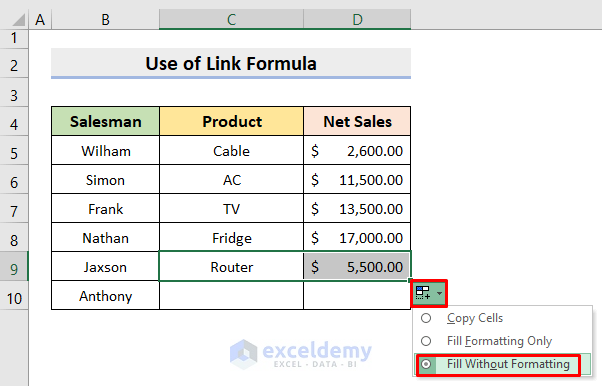How to Link Excel Sheets Easily

Understanding Excel Linking

In Microsoft Excel, the capability to link sheets within the same workbook or across different workbooks is an indispensable tool for productivity, streamlining your data management processes, and enhancing overall efficiency. By linking Excel sheets, you create a dynamic environment where updates in one part of your data automatically reflect in all associated cells or tables, thereby ensuring data consistency and saving time on manual updates.
Linking Sheets within the Same Workbook

Here's how to link cells or ranges within the same Excel workbook:
- Select the Destination Cell: Choose the cell where you want the linked data to appear.
- Enter the Link Formula: Start with an equal sign (=) followed by the sheet name, an exclamation mark (!), and then the cell or range you want to link. For example, to link cell A1 from "Sheet2" into "Sheet1", type =Sheet2!A1 into the destination cell.
- Press Enter: After typing the formula, press enter to complete the link.
Here is an example of how you might link data:
| Sheet Name | Cell Reference | Link Formula |
|---|---|---|
| Sheet1 | A1 | =Sheet2!A1 |
| Sheet1 | B1 | =Sheet3!B1 |
| Sheet1 | C1 | =Sheet4!C1 |

🔗 Note: Ensure the sheet names are correctly typed to avoid #REF! errors, indicating the referenced sheet or cell does not exist.
Linking Sheets in Different Workbooks

Linking data between separate Excel workbooks might be necessary when you are working with multiple datasets:
- Open Both Workbooks: You need both files open to create the link.
- Select the Destination Cell: Click on the cell where you want the linked data to appear.
- Begin the Link Formula: Start by typing an equal sign (=) in the destination cell, then use the full file path to reference the workbook. For example, =[Budget.xlsx]Sheet1!A1 to link cell A1 from Sheet1 of the "Budget" workbook.
- Use File Path for Workbook: If both workbooks are open, you can browse for the workbook or type the path manually.
- Press Enter: Finish by pressing Enter to establish the link.
Here's an example of linking data across workbooks:
| Workbook Name | Sheet Name | Cell Reference | Link Formula |
|---|---|---|---|
| Workbook1.xlsx | Sheet1 | A1 | =[Workbook2.xlsx]Sheet2!A1 |
| Workbook1.xlsx | Sheet1 | B1 | =[Workbook2.xlsx]Sheet3!B1 |
🔍 Note: If you rename or move the source workbook, Excel will attempt to update the link automatically. However, changes to file paths or sheet names can break links. Use the Edit Links feature to manage and update links if needed.
Linking with Named Ranges

Named ranges can simplify linking:
- Define a Named Range: Select the cells and define a name for this range in the Name Box or through Name Manager (Formulas tab > Name Manager > New).
- Create Link: In the destination sheet, type the formula referencing the named range, e.g., =[OtherSheet]DataRange.
- Press Enter: Complete the link by pressing Enter.
Updating and Managing Links

Managing links is important to keep your data up-to-date:
- Update Links: Upon opening a workbook with external links, Excel will ask if you want to update links. Choosing to update ensures the latest data is reflected.
- Edit Links: Access the Edit Links dialog box to manage, break, or change links in the Data tab.
- Be Wary of Breaks: Moving or renaming workbooks or sheets can break links. Use the Edit Links feature to fix these issues.
Linking sheets in Excel provides numerous advantages, allowing for dynamic data flow, automatic updates, and easier data management. Whether within a single workbook or across multiple documents, the flexibility to link cells or ranges streamlines your work process, reducing errors and saving time. Remember to manage your links effectively to ensure data integrity and to leverage the full potential of Excel for your data needs.
Summarizing, linking sheets in Excel streamlines your data management, ensures consistency across multiple documents, and saves time on manual updates. Here are the key points to remember:
- Linking within the same workbook uses simple formulas starting with an equal sign and sheet name.
- Cross-workbook linking requires open workbooks and uses file paths to reference cells.
- Named ranges can simplify the linking process and make formulas easier to read.
- Managing links through Excel's interface is essential for updates, repairs, and maintenance.
- Pay attention to file paths and sheet names to avoid link breaks and data inconsistencies.
Can I link multiple cells at once in Excel?

+
Yes, you can link multiple cells using array formulas or by copying the link formula to multiple cells. Ensure the cell references in the formula update automatically for each linked cell.
What happens if I rename a sheet with linked cells?

+
Renaming a sheet can break links unless Excel can locate the sheet name within the same workbook. Use Edit Links to update references if needed.
How do I remove a link from a cell in Excel?

+
To remove a link, simply edit the cell and delete or change the formula. You can also break links through the Edit Links dialog box in the Data tab.



